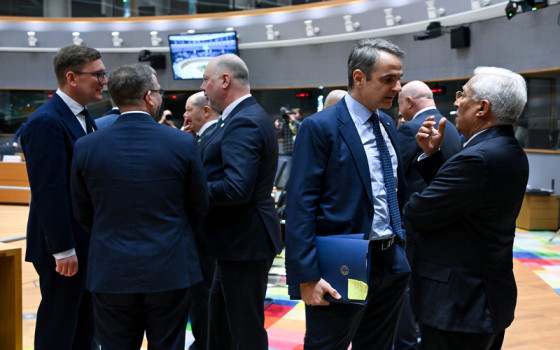
EU leaders summit in Copenhagen discusses defense readiness, support for Ukraine, and Russian threats

- Europe and Arabs
- Wednesday , 1 October 2025 9:31 AM GMT
Brussels – Copenhagen: Europe and the Arabs
Leaders of the European Union member states are meeting in Copenhagen on Wednesday for a summit. This is a crucial time. EU President Antonio Costa stated, "Our focus will be twofold: strengthening our common European defense capabilities and bolstering our support for Ukraine." He added in his letter inviting the leaders to the summit, "Russia's recent violations of airspace over Poland and Romania are a stark reminder of the need to accelerate and deepen our efforts." He also said, “In previous meetings, we agreed that Europe needs to do more – and we need to do more together – in the area of defense. The direction is clear: we are building a Europe capable of responding effectively, independently, and collaboratively to the threats of today and tomorrow. The ambition we have set ourselves, to decisively enhance Europe’s collective defense capabilities by 2030, embodies this commitment. In recent months, we have taken important steps to strengthen defense funding, support our industrial base, and commit to joint efforts to develop capabilities, particularly in improving interoperability, joint procurement, and pooling demand to achieve economies of scale. This work is fully coordinated with NATO and focuses on the nine priority areas agreed at EU level. As we increase our investments, we must also invest more efficiently and rationally, including through common instruments such as SAFE. Every euro should strengthen our common security and strategic autonomy. It also means strengthening the European defense industry, driving innovation, boosting competitiveness, and creating jobs. Similarly, we must draw lessons from the war in Ukraine, including by strengthening cooperation with the Ukrainian defense sector and leveraging Ukraine’s unique experience. It is time to move forward. In Copenhagen, I propose that we focus on concrete steps to enhance capabilities, with the aim of building a shared understanding of what the EU and Member States need to do to achieve our 2030 defense readiness target. The ongoing work on the roadmap will support our collective efforts. We need to provide guidance in this regard. Our discussion will focus on the following topics: How to achieve faster progress: based on our decisions.” Previously, we discussed how we can accelerate the development of common capabilities. This includes making the best possible use of the lead nation approach for priority projects within a coherent overall strategy, advancing simplification, interoperability, and standardization, and giving European industry the predictability it needs;
Supporting our eastern flank: How can we use our tools and programs to support our Member States on the eastern flank in the face of growing threats?
Governance: How can we ensure effective political oversight and coordination – in particular, to monitor capability gaps and measure progress, including by setting key milestones? And how, in particular, can we strengthen the role of defense ministers in the Council to this end?
Our security is linked to Ukraine's security. In Copenhagen, I would also like to discuss how we can continue to support Ukraine and achieve a just and lasting peace.
The EU and its Member States have been at the forefront in providing vital economic, military, and political support to Ukraine. I propose that we focus on how we can continue to support Ukraine in a reliable and predictable manner.
In recent weeks, we have seen significant progress on security guarantees within the framework of the willing partners coalition. To help Ukraine achieve a just and lasting peace, we should specifically consider how to continue supporting the Ukrainian Armed Forces as the fundamental guarantee of the country's sovereignty and security, while increasing pressure on Russia, including through tougher sanctions.
Ukraine's accession process to the EU must remain on track. Despite the war, reform efforts in Ukraine have been remarkable. We must ensure that this momentum translates into concrete steps towards accession.
We will return to both topics – European defense and Ukraine – at the European Council meeting in... Brussels at the end of October, where we will formalize our guidelines. The European news site "The Observer" stated that the informal summit will focus on Ukraine, frozen Russian assets, common defense, and sanctions against Israel. It added, "These talks come amid concerns about recent Russian airspace violations and drone incursions into Europe, including sightings near Copenhagen airport, the capital of the current Danish EU presidency, which led to a suspension of all takeoffs and landings for several hours. These incidents have raised questions about the security of European airspace and its readiness to address security threats." Discussions on Ukraine are also influenced by the recent shift in tone by US President Donald Trump, who said that Ukraine "can regain all of its territory." However, Polish Prime Minister Donald Tusk warned that this is more of a rhetorical shift than a clear change in policy. The Polish leader said, "Behind this sudden optimism lies a promise to reduce US involvement and shift the responsibility for ending the war to Europe. Reality is better than illusions." Foreign policy coordinator Kaja Kallas said, "There are no indications" that Russian President Vladimir Putin is interested in a negotiated peace without Ukraine's surrender – a stance echoed by other Western countries, such as Britain. With winter approaching and Russia expected to escalate its attacks on the country's power grid, energy security is a major concern, along with the continued strain on Ukraine's budget and its war economy. The EU's plans to use its frozen Russian assets as a "reimbursement loan" for Ukraine will also be discussed, a proposal now supported by Germany. However, other countries, such as Belgium, remain skeptical.












No Comments Found